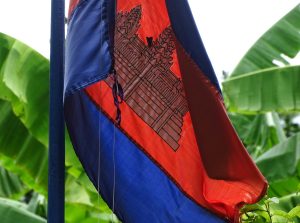Cambodia’s National Assembly yesterday passed a controversial legal provision giving the government the authority to revoke the citizenship of any Cambodian national accused of “colluding” with foreign powers.
The amendment to Cambodia’s 1996 Law on Nationality passed the parliament with the unanimous support of the 120 lawmakers present.
As with so many other changes to Cambodian laws, the amendment follows a call by former Prime Minister Hun Sen, who, during a visit to troops serving along the disputed border with Thailand in late June, said that the country needed a law to strip the citizenship of those who “side with foreign nations to harm our country.”
The change required an amendment to the country’s Constitution that was passed nearly unanimously through both houses of parliament and signed by King Norodom Sihamoni last month. Article 33 of the Constitution previously stated that Khmer citizens “shall not be deprived of their nationality.” This line has now been removed and replaced with a phrase stating that “acquisition and loss of Cambodian citizenship, including withdrawal, shall be determined by law.”
The amendment has been opposed by Cambodian civil society groups, 50 of which claimed in a statement earlier this week that the new provisions are “vaguely written, and will have a disastrously chilling effect on the freedom of speech of all Cambodian citizens.”
“The potential for abuse in the implementation of this vaguely worded law to target people on the basis of their ethnicity, political opinions, speech, and activism is simply too high to accept,” the groups stated. “The government has many powers, but they should not have the power to arbitrarily decide who is and is not a Cambodian.”
In responding to these criticisms, Justice Minister Keut Rith told lawmakers ahead of yesterday’s vote that the bill was aimed at safeguarding sovereignty and national security and would “only apply to individuals who collude with foreign powers to damage Cambodia’s national interests.” He added, “Its purpose is to protect patriotism and the loyalty of the Khmer people.” Interior Minister Sar Sokha similarly told the Assembly that the conditions outlined in the law would “apply only to traitors.”
None of this is very reassuring given the Cambodian People’s Party (CPP)’s history of using accusations of “treason” and “collusion” to silence dissenters and political opponents. As I noted after last month’s constitutional amendment, the law will most likely be used against Cambodian opposition figures living abroad, many of whom also hold or have sought to acquire foreign citizenship.
The attempt to proscribe foreign collusion takes on additional salience in the context of the current border dispute with Thailand, which flared into a five-day conflict in late July. The conflict has prompted a remarkable alignment of Cambodian media and expert opinion behind Prime Minister Hun Manet’s government, and a widespread sense of national emergency.
These new legal powers will give the CPP government ever more powers to police the bounds of political discourse, while the border dispute will only lower the threshold of what constitutes foreign “collusion” or “treason.” Given the prevailing atmosphere of patriotic fervor, few are likely to sound any note of opposition if the government accuses a certain group or individual of undermining national security or colluding with any other foreign power.

































